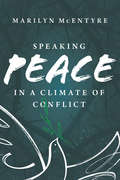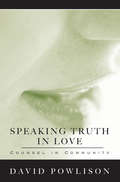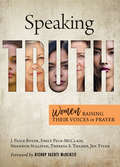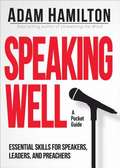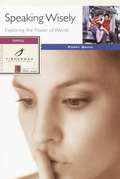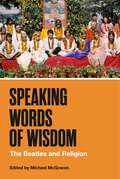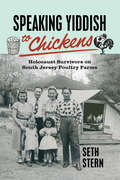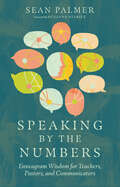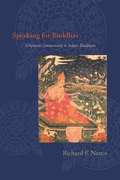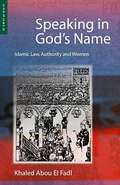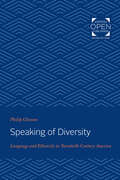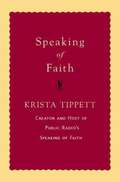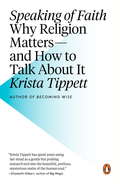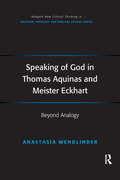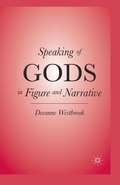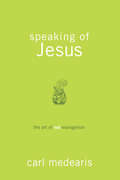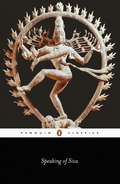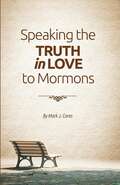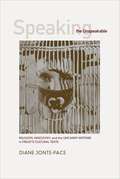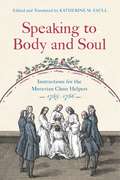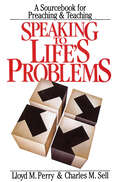- Table View
- List View
Speaking Peace in a Climate of Conflict
by Marilyn McEntyreWhat can we learn from contemporary writers about keeping public conversation compassionate, vigorous, faithful, and life-giving?Those who want to avoid simplistic partisan rhetoric and use words in a challenging, spirited way need practical strategies. This book offers a range of them. Drawing upon the work of exemplary contemporary writers, Speaking Peace in a Climate of Conflict shows how to speak and write clearly and generously. For example, we can attend more carefully to the effects of metaphors, recognize and avoid glib euphemisms, define terms in ways that retrieve core meanings and revitalize them, and enrich our sense of history by deft use of allusion. Contemporary readers are awash in many words that have been cheapened and profaned. But with deliberate use of intelligence and grace we can redeem their &“sacramentality&”—humanely uttered words can convey life-giving clarity and compassion. Speaking Peace in a Climate of Conflict is an homage to outstanding wordsmiths who have achieved that potential and an invitation to follow them in making well-chosen words instruments of peace.
Speaking Truth in Love: Counsel in Community (Vantage Point Book Ser.)
by David PowlisonYou probably speak 20,000 words a day, give or take, and each one influences those who listen. No wonder God has so much to say about our words. We are all counselors, whether we realize it or not!Speaking Truth in Love is a blueprint for communication that strengthens community in Christ. The principles outlined in this pivotal work are specific to counseling, yet extend to marriage, family, friendship, business, and the church. Have you ever wondered how to be a more effective counselor? Have you ever looked for a better way to talk to difficult people? Have you ever wanted to express faith and love more naturally in your relationships?Practical in its approach yet comprehensive in its scope, Speaking Truth in Love is sure to become required reading for anyone interested in pursuing a career as a counselor or anyone else who longs for ways to redeem relationships.
Speaking Truth: Women Raising Their Voices in Prayer
by Shannon Sullivan Emily Peck-McClain J. Paige Boyer Jen Tyler Theresa S. ThamesWomen are fierce and fed-up, and they have been joining hands together for the purposes of societal change for as long as there has been injustice. Women of faith are guided by the Holy Spirit to work together to bring down these injustices, to build on the foundation Christ laid for the beloved community of God on earth. This book is women joining together to speak and act in new ways in response to the increasing challenges of our day. This book offers to all women the sustenance needed to face blatant racism, bigotry, sexism, heterosexism, and xenophobia in the world and in the church. The writers of Speaking Truth greet these challenges knowing that the Good News of Jesus Christ is bigger than any societal ill and that God has called us to play a part in God’s work of transformation. When we pray together and act together, we claim a new vision for how things can be - a vision God gives us through Scripture. We can support both ourselves and other women as we learn to find and claim our voices and end the silences imposed upon us. Speaking Truth: • Provides inspirational writings by women for women to face the societal challenges specific to today.• Includes prayers, devotions, scriptures, and inspirational quotes for special challenges.• Encourages women supporting, advocating, and praying for other women.
Speaking Well: Essential Skills for Speakers, Leaders, and Preachers
by Adam HamiltonThe thought of speaking in publicstrikes fear in the hearts of many. But we are often called upon tospeak, teach, preach, or make presentations in our work and personallives. In Speaking Well, Adam Hamilton offers nineteen powerful tips and tactics that lead to excellent speaking in any setting. "One of today’s masters instructs us in the art of public speaking. I wish I’d had this book twenty years ago!" —Cal Turner, retired CEO of Dollar General "A great and fun book for all who speak in public . . ." —Jerre Stead, Chairman and CEO of IHS Inc."Adam teaches us how to use the gift of words effectively and in ways that elevate and inspire those who hear them. " —Irvine O. Hockaday Jr., retired President and CEO of Hallmark Cards (1985–2001) "This little book will improve your preparation, content, delivery, and impact." —Patricia Farris, Senior Minister, First United Methodist Church, Santa Monica, CA "Want to be a better speaker? Readthis book! It will remind you of things you know but have forgotten andwill give you new practices to follow." —O. Wesley Allen Jr., Perkins School of Theology, Southern Methodist University, Dallas, TX "An unbelievably helpful pocket resource . . ." —Frank Thomas, Christian Theological Seminary, Indianapolis, IN "If you want to become a better public speaker, take lessons from a master." —Mike Bonem, speaker, consultant, and author of Leading from the Second Chair
Speaking Wisely: Exploring the Power of Words (Fisherman Bible Studyguide Series)
by Poppy SmithReaders will learn how to help others by cultivating the habit of using words that encourage, express love, and praise God.From the Trade Paperback edition.
Speaking Words of Wisdom: The Beatles and Religion (American Music History)
by Michael McGowan“More popular than Jesus.”Despite the uproar it caused in America in 1966, John Lennon’s famous assessment of the Beatles vis-à-vis religion was not far off. The Beatles did mean more to kids than the religions in which they were raised, not only in America but everywhere in the world.By all accounts, the Beatles were the most significant musical group of the twentieth century. Their albums sold in the hundreds of millions, and the press was always eager to document their activities and perspectives. And when fan appreciation morphed into worship, Beatlemania took on religious significance. Many young people around the world began to look to the Beatles—their music, their commentary, their art—for meaning in a turbulent decade. Speaking Words of Wisdom is a deep dive into the Beatles’ relationship to religion through the lenses of philosophy, cultural studies, music history, and religious studies. Chapters explore topics such as religious life in Liverpool, faith among individual band members, why and how India entered the Beatles’ story, fan worship/deification, and the Beatles’ long-lasting legacy. In the 1960s, the Beatles facilitated a reevaluation of our deepest values. The story of how the Beatles became modern-day sages is an important case study for the ways in which consumers make culturally and religiously significant meaning from music, people, and events.In addition to the editor, the contributors to this book include David Bedford, Kenneth Campbell, John Covach, Melissa Davis, Anthony DeCurtis, Mark Duffett, Scott Freer, Murray Leeder, Sean MacLeod, Grant Maxwell, Christiane Meiser, and Eyal Regev.
Speaking Yiddish to Chickens: Holocaust Survivors on South Jersey Poultry Farms
by Seth SternMost of the roughly 140,000 Holocaust survivors who came to the United States in the first decade after World War II settled in big cities such as New York. But a few thousand chose an alternative way of life on American farms. More of these accidental farmers wound up raising chickens in southern New Jersey than anywhere else. Speaking Yiddish to Chickens is the first book to chronicle this little-known chapter in American Jewish history when these mostly Eastern European refugees – including the author’s grandparents - found an unlikely refuge and gateway to new lives in the US on poultry farms. They gravitated to a section of south Jersey anchored by Vineland, a small rural city where previous waves of Jewish immigrants had built a rich network of cultural and religious institutions. This book relies on interviews with dozens of these refugee farmers and their children, as well as oral histories and archival records to tell how they learned to farm while coping with unimaginable grief. They built small synagogues within walking distance of their farms and hosted Yiddish cultural events more frequently found on the Lower East Side than perhaps anywhere else in rural America at the time. Like refugees today, they embraced their new American identities and enriched the community where they settled, working hard in unfamiliar jobs for often meager returns. Within a decade, falling egg prices and the rise of industrial-scale agriculture in the South would drive almost all of these novice poultry farmers out of business, many into bankruptcy. Some hated every minute here; others would remember their time on south Jersey farms as their best years in America. They enjoyed a quieter way of life and more space for themselves and their children than in the crowded New York City apartments where so many displaced persons settled. This is their remarkable story of loss, renewal, and perseverance in the most unexpected of settings. Author Facebook page (https://www.facebook.com/YiddishtoChickens)
Speaking by the Numbers: Enneagram Wisdom for Teachers, Pastors, and Communicators
by Sean PalmerIt's not just what you say, but how you say it.Speaking by the Numbers
Speaking for Buddhas
by Richard F. NanceAs with many religious and philosophical traditions, Buddhist intellectual discourse owes its development to a dynamic interplay of primary source material and subsequent interpretation, yet until now Buddhist scholarship has neglected to privilege one crucial series of texts. Commentaries on Buddhist scripture, particularly the sutras, written by seminal thinkers across the history of Indian Buddhism, contain myriad insights into the relationship between textual analysis and ritual practice. Evaluating these commentaries in detail for the first time, Richard F. Nance revisits-and rewrites-the critical history of Buddhist thought, including its unique conception of doctrinal transmission. Written by such luminaries as Nagarjuna, Vasubandhu, Dignaga, and Santideva, scriptural commentaries have long played an important role in the monastic and philosophical life of Indian Buddhism. Nance reads these texts against the social and cultural conditions of their making, establishing a solid historical basis for the interpretation of key beliefs and doctrines. He also underscores areas of contention, in which scholars debate what it means to speak for, and as, a Buddha. Throughout these texts, Buddhist commentators struggle to deduce and characterize the speech of Buddhas and teach others how to convey and interpret its meaning. At the same time, they demonstrate the fundamental dilemma of trying to speak on behalf of Buddhas. Nance also investigates the notion of "right speech" as articulated by Buddhist texts and follows ideas about teaching as imagined through the common figure of a Buddhist preacher. He notes the use of epistemological concepts in scriptural interpretation and the protocols guiding the composition of scriptural commentary. He then translates three such commentarial guides to better clarify the normative assumptions organizing these scholars' work.
Speaking for Buddhas: Scriptural Commentary in Indian Buddhism
by Richard NanceBuddhist intellectual discourse owes its development to a dynamic interplay between primary source materials and subsequent interpretation, yet scholarship on Indian Buddhism has long neglected to privilege one crucial series of texts. Commentaries on Buddhist scriptures, particularly the sutras, offer rich insights into the complex relationship between Buddhist intellectual practices and the norms that inform-and are informed by-them. Evaluating these commentaries in detail for the first time, Richard F. Nance revisits-and rewrites&mdashthe critical history of Buddhist thought, including its unique conception of doctrinal transmission.Attributed to such luminaries as Nagarjuna, Vasubandhu, Dignaga, and Santideva, scriptural commentaries have long played an important role in the monastic and philosophical life of Indian Buddhism. Nance reads these texts against the social and cultural conditions of their making, establishing a solid historical basis for the interpretation of key beliefs and doctrines. He also underscores areas of contention, in which scholars debate what it means to speak for, and as, a Buddha. Throughout these texts, Buddhist commentators struggle to deduce and characterize the speech of Buddhas and teach others how to convey and interpret its meaning. At the same time, they demonstrate the fundamental dilemma of trying to speak on behalf of Buddhas. Nance also investigates the notion of "right speech" as articulated by Buddhist texts and follows ideas about teaching as imagined through the common figure of a Buddhist preacher. He notes the use of epistemological concepts in scriptural interpretation and the protocols guiding the composition of scriptural commentary, and provides translations of three commentarial guides to better clarify the normative assumptions organizing these works.
Speaking in God's Name: Islamic Law, Authority and Women
by Khaled Abou El FadlThis challenging new book reviews the ethics at the heart of the Islamic legal system, and suggests that these laws have been misinterpreted by certain sources in an attempt to control women.
Speaking of Diversity: Language and Ethnicity in Twentieth-Century America
by Philip GleasonOriginally published in 1992. In this collection of essays, Philip Gleason explores the different linguistic tools that American scholars have used to write about ethnicity in the United States and analyzes how various vocabularies have played out in the political sphere. In doing this, he reveals tensions between terms used by academic groups and those preferred by the people whom the academics discuss. Gleason unpacks words and phrases—such as melting pot and plurality—used to visualize the multitude of ethnicities in the United States. And he examines debates over concepts such as "assimilation," "national character," "oppressed group," and "people of color." Gleason advocates for greater clarity of these concepts when discussed in America's national political arena. Gleason's essays are grouped into three parts. Part 1 focuses on linguistic analyses of specific terms. Part 2 examines the effect of World War II on national identity and American thought about diversity and intergroup relations. Part 3 discusses discourse on the diversity of religions. This collection of eleven essays sharpens our historical understanding of the evolution of language used to define diversity in twentieth-century America.
Speaking of Faith
by Krista TippettTippett addresses many voices and concerns about religion, huge cultural shifts and reversals, drawing from her conversations with theologians, ethicists and activists on her radio show.
Speaking of Faith
by Krista TippettAn intimate, thought-provoking, and original appraisal of the meaning of religion in our time- from the creator and host of public radio's Speaking of Faith Krista Tippett, widely becoming known as the Bill Moyers of radio, is one of the country's most intelligent and insightful commentators on religion, ethics, and the human spirit. With this book, she draws on her own life story and her intimate conversations with both ordinary and famous figures, including Elie Wiesel, Karen Armstrong, and Thich Nhat Hanh, to explore complex subjects like science, love, virtue, and violence within the context of spirituality and everyday life. Her way of speaking about the mysteries of life-and of listening with care to those who endeavor to understand those mysteries-is nothing short of revolutionary. .
Speaking of Faith: Why Religion Matters--and How to Talk About It
by Krista TippettAn intimate, thought-provoking, and original appraisal of the meaning of religion in our time- from the creator and host of public radio's Speaking of Faith Krista Tippett, widely becoming known as the Bill Moyers of radio, is one of the country's most intelligent and insightful commentators on religion, ethics, and the human spirit. With this book, she draws on her own life story and her intimate conversations with both ordinary and famous figures, including Elie Wiesel, Karen Armstrong, and Thich Nhat Hanh, to explore complex subjects like science, love, virtue, and violence within the context of spirituality and everyday life. Her way of speaking about the mysteries of life-and of listening with care to those who endeavor to understand those mysteries-is nothing short of revolutionary.Krista Tippett's newest book, Becoming Wise, will be published on April 5, 2016.From the Trade Paperback edition.
Speaking of God in Thomas Aquinas and Meister Eckhart: Beyond Analogy (Routledge New Critical Thinking in Religion, Theology and Biblical Studies)
by Anastasia WendlinderMedieval masters Thomas Aquinas and Meister Eckhart considered problems inherent to speaking of God, exploring how religious language might compromise God's transcendence or God's immanence ultimately hindering believers in their journey of faith seeking understanding. Going beyond ordinary readings of Aquinas and building a foundation for further insights into the works of both theologians, this book draws out the implications of the thought of Eckhart and Aquinas for contemporary issues, including ecumenical and inter-religious dialogue, liturgy and prayer, and religious inclusivity. Reading Aquinas and Eckhart in light of each other reveals the profound depth and orthodoxy of both of these scholars and provides a novel approach to many theological and practical religious issues.
Speaking of Gods in Figure and Narrative
by Deeanne WestbrookSpeaking of Gods analyzes the figurative-narrative creation of gods, their heavenly abodes, and behaviors, reaching back to the beginning of history in Sumer, Babylon, Egypt, Persia and Greece, and continuing through the figures and narratives of a biblical tradition that includes the Hebrew Bible, the New Testament, and the Qur'an.
Speaking of Jesus
by Carl MedearisSome of us fear moments when we need to defend our theology. Some of us seek them out. But we are seldom ready the way Jesus seemed to be ready. So how do we draw others to God in the midst of these ordinary conversations the way Jesus did? In Speaking of Jesus, Carl Medearis draws on his experience of international reconciliation between Muslims and Christians to remind us of the heart of the matter: Jesus. Here he gives us tools, stories, and the foundation we need to move beyond "us" and "them" and simply talk about the One who changes it all. As Carl writes, "While others are explaining and defending various isms and ologies we're simply pointing people to our friend. The one who uncovers and disarms. Who leads people right to himself. The beginning and the end of the story. A good story indeed."
Speaking of Siva
by A. K. RamanujanSpeaking of Siva is a selection of vacanas or free-verse sayings from the Virasaiva religious movement, dedicated to Siva as the supreme god. Written by four major saints, the greatest exponents of this poetic form, between the tenth and twelfth centuries, they are passionate lyrical expressions of the search for an unpredictable and spontaneous spiritual vision of 'now'. Here, yogic and tantric symbols, riddles and enigmas subvert the language of ordinary experience, as references to night and day, sex and family relationships take on new mystical meanings. These intense poems of personal devotion to a single deity also question traditional belief systems, customs, superstitions, image worship and even moral strictures, in verse that speaks to all men and women regardless of class and caste.
Speaking of Siva (Penguin Classics)
by A. K. RamanujanSpeaking of Siva is a selection of vacanas or free-verse sayings from the Virasaiva religious movement, dedicated to Siva as the supreme god.
Speaking the Truth in Love to Mormons
by Mark CaresThis book offers techniques for witnessing to Mormons in a non-confrontational, Christian way.
Speaking the Unspeakable: Religion, Misogyny, and the Uncanny Mother in Freud's Cultural Texts
by Diane Jonte-PaceIn this bold rereading of Freud's cultural texts, Diane Jonte-Pace uncovers an undeveloped "counter thesis," one that repeatedly interrupts or subverts his well-known Oedipal masterplot. The counter thesis is evident in three clusters of themes within Freud's work: maternity, mortality, and immortality; Judaism and anti-Semitism; and mourning and melancholia.
Speaking to Body and Soul: Instructions for the Moravian Choir Helpers, 1785–1786 (Pietist, Moravian, and Anabaptist Studies #2)
by Katherine M. FaullDating back to 1785, the Moravian “Instructions for the Choir Helpers” contain detailed advice for the spiritual counselors of the men, women, and children in Moravian congregations on how to address concerns about one’s body and soul. In this volume, Katherine Faull presents an annotated, translated edition of the original German manuscript.In monthly “speakings”—regularly scheduled dialogues between the choir helper and individual church members to determine whether the congregant could be admitted to communion—men and women received spiritual guidance on topics as varied as the physical manifestations of puberty, sexual attraction, frequency of intercourse, infant care, and bereavement. From their founding in 1722, the Moravians were remarkable for their positive evaluation of the body; they held that the natural manifestations of masculinity and femininity were integral elements of spiritual consciousness. The “Instructions for the Choir Helpers”—which were highly confidential at the time and passed on only by permission of the church administration—reflect that philosophy, providing insights into an interpretation of the body as a holistic system that should be cared for as a vessel for the spirit.A unique resource for scholars of religious history, gender studies, and colonial American church history, Faull’s translation of this fascinating set of documents provides an unprecedented glimpse into a period of foundational change in Moravian history.
Speaking to Life's Problems
by Lloyd Perry Charles SellDon't just preach the Bible; preach it to people. Your parishioners are hurting. They have practical, urgent problems. They&’re asking tough questions. Are your sermons answering those questions, meeting those needs, speaking to those problems? More than a textbook on sermon preparation, Speaking to Life&’s Problems gives you biblical and psychological insight into contemporary problems like anxiety, guilt, fear, failure, indecision, and loneliness. Rich in illustrations, Speaking to Life&’s Problems is filled with short sermons and ideas that can be developed and fitted to your particular congregation or class, making your lessons more engaging, relevant, and meaningful. The best sermons are those that speak to the heart, not just the mind. These insights will help you deliver sermons that resonate with the whole person, thus making a greater impact. You can preach sermons that capture the attention of your congregation, speak effectively on subjects that matter to them, and help resolve their tensions, relieve their pressures, and lighten their despair. Helpful features include:Extensive bibliography and sermon sources to help you find to relevant material. Scriptural passages on each problem, useful as sermon texts Spiritual guidance for preparing messages.
Speaking to Life's Problems
by Lloyd Perry Charles SellDon't just preach the Bible; preach it to people. Your parishioners are hurting. They have practical, urgent problems. They&’re asking tough questions. Are your sermons answering those questions, meeting those needs, speaking to those problems? More than a textbook on sermon preparation, Speaking to Life&’s Problems gives you biblical and psychological insight into contemporary problems like anxiety, guilt, fear, failure, indecision, and loneliness. Rich in illustrations, Speaking to Life&’s Problems is filled with short sermons and ideas that can be developed and fitted to your particular congregation or class, making your lessons more engaging, relevant, and meaningful. The best sermons are those that speak to the heart, not just the mind. These insights will help you deliver sermons that resonate with the whole person, thus making a greater impact. You can preach sermons that capture the attention of your congregation, speak effectively on subjects that matter to them, and help resolve their tensions, relieve their pressures, and lighten their despair. Helpful features include:Extensive bibliography and sermon sources to help you find to relevant material. Scriptural passages on each problem, useful as sermon texts Spiritual guidance for preparing messages.
